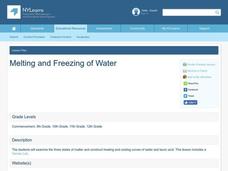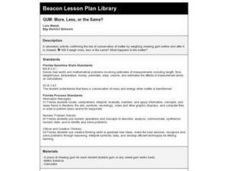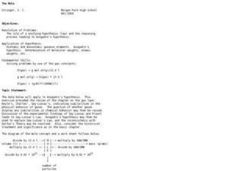Integrated Physics and Chemistry
Law of Conservation of Matter
Does mass change during a chemical reaction? Demonstrate the Law of Conservation of Matter while encouraging class members to be creative with a two-part lesson. First, learners use Alka-Seltzer® tablets and water to demonstrate the...
Virginia Department of Education
Matter and Energy: Equations and Formulas
Using simple materials, an informative activity demonstrates the Law of Conservation of Matter and explains how to balance chemical equations. Young chemists perform experiments, analyze reactions, and balance chemical equations on their...
Columbus City Schools
What’s Up with Matter?
Take a "conservative" approach to planning your next unit on mass and matter! What better way to answer "But where did the gas go?" than with a lab designed to promote good report writing, research skills, and detailed observation. The...
LABScI
Conservation of Momentum: Marble Collisions
What happens to the momentum of an object when it strikes another object? Scholars roll a marble down a ramp so it collides with another marble. By measuring the speed of each marble before and after the collision, pupils answer this...
Cornell University
Chemical Reactions
Investigate the Law of Conservation of Mass through a lab exploration. Individuals combine materials to initiate chemical reactions. They monitor for signs of reactions and measure the masses before and after the reactions for comparison.
Curated OER
The Conservation Of Mass (The Mass Of Gas)
Students gain an understanding of matter in all of its phases. In this science lesson plan, students further their knowledge of the laws of conservation of mass, the loss in mass can be accounted for, when the gas is allowed to escape...
Virginia Department of Education
A Crystal Lab
Young chemists grow ionic crystals, metallic crystals, and supersaturated crystals in three different lab experiments. Observing these under a microscope allows pupils to compare the various structures.
Curated OER
Conserving Chemical Resources
Students balance chemical equations and solve for gram to mole ratios.
Columbus City Schools
Changes All Around Us
Whoa! What just happened? That's right, change is everywhere. But what exactly is changing? Middle school science sleuths get to the bottom of the changes matter can experience. Through simple demonstrations, engaging videos, and an...
Sargent Art
Protect Our Marine Life
Encourage water conservation and boost art skills with a hands-on activity that challenges young painters to create a scene highlighting marine life. Using oil pastels, scholars draw an underwater scene and write a tip for viewers to...
Curated OER
Melting and Freezing of Water
Students examine the three states of matter. They identify the segments of heating and cooling curves. Students analyze data and create a graph to determine the freezing and melting temperature of water.
Columbus City Schools
ABC: Acid Base Chemistry
Bubble, bubble, boil and trouble! What causes common substances like baking soda and vinegar to react the way they do? Welcome your junior chemists to the wonders of acid-base chemistry using a comprehensive and fun resource. Engage them...
Curated OER
GUM: More, Less, or the Same?
Students confirm the law of conservation of matter by weighing chewing gum before and after it is chewed.
Curated OER
Model Mania
Eighth graders study the conservation of matter. In this chemical reaction lesson students examine what happens during a chemical reaction and complete a lab activity.
Curated OER
What Influences Reaction Rate?
Students study reaction rates, what determines how fast a reaction happens and how the chemical changes occur. In this reactions lesson students complete a lab where they use Alka-Seltzer to observe reaction rate and create a graph with...
Science Matters
Peanut Energy
How do humans get energy since they aren't mechanical and can't photosynthesize? Learners explore this question by relating potential energy in food to human energy levels. Scholars measure the change in mass and a change in temperature...
Virginia Department of Education
Aspirin Analysis
Laughter may be the best medicine, but aspirin is also important. Young chemists analyze aspirin tablets using titration in this lab experiment. They then repeat the entire experiment using a different aspirin brand.
Curated OER
Balancing Bottles
Students explore the Law of Conservation of Matter using effervescent tablets. In this mass and energy lesson, students investigate how mass is conserved in the reaction of effervescent tablets and water. They will discuss and journal...
Curated OER
The Mole
Pupils explore the concent of using the mole to solve problems related to counts small particles of matter. Students work individually and in groups to complete conversions of substances from moles to matter.
Curated OER
Physical and Chemical Changes
Young scholars examine the different changes in matter. In this chemical change lesson plan students determine the amount of reactant made in a reaction using the law of conservation.
Curated OER
No Creation-No Destruction--All in a Baggie
Students investigate the concepts of conservation of mass and simple chemical reactions. Students complete lab experiments and record all observations as well as conduct experiments on their own to determine which reactions created...
LABScI
Freezing Point Depression: Why Don’t Oceans Freeze?
Can you go ice fishing in the ocean? Learners examine the freezing point of different saltwater solutions. Each solution has a different concentration of salt. By comparing the freezing points graphically, they make conclusions about...
Curated OER
Chemical Composition of American Coins
Students investigate the chemical composition of pennies dated 1983 or later. In this chemical composition of American coins lesson plan, students scratch the surface of the penny to expose the zinc core. They put the penny in...
Curated OER
Top Quark Lab
Pupils find the mass of the top quark. In this physics lesson, students create a vector diagram from a given set of data. They discuss their calculations and findings in class.

























